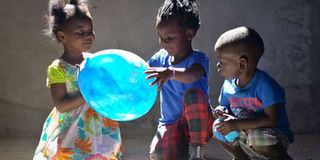Does religion affect children’s generosity?

A new study suggests that children from religious families are less likely to share with others than children from non-religious families. PHOTO | FILE
What you need to know:
- Around 43 per cent of the youngsters were Muslim, 23.9 per cent Christian, 2.5 per cent Jewish, 1.6 per cent Buddhist, 0.4 per cent Hindu, 0.2 per cent agnostic, and 0.5 per cent were identified as “other” and 27.6 per cent as not religious.
A new study suggests that children from religious families are less likely to share with others than children from non-religious families.
In the research, The Negative Association between Religiousness and Children’s Altruism across the World, a team of developmental psychologists from the US, Canada, Jordan, South Africa, Turkey and China assessed altruism and third-party evaluation of scenarios depicting interpersonal harm in 1,170 children aged between 5 and 12 in the six countries, the religiousness of their households, and parent-reported child empathy and sensitivity to justice.
Around 43 per cent of the youngsters were Muslim, 23.9 per cent Christian, 2.5 per cent Jewish, 1.6 per cent Buddhist, 0.4 per cent Hindu, 0.2 per cent agnostic, and 0.5 per cent were identified as “other” and 27.6 per cent as not religious.
They had to decide how many stickers they would like to share with an anonymous individual from the same school and of a similar ethnic group.
The researchers found that children from non-religious families showed the most generosity while children from more religious families showed less generosity.
They write:
“Together these results reveal the similarity across countries in how religion negatively influences children’s altruism, challenging the view that religiosity facilitates prosocial behavior”.
The paper is in the journal Current Biology.




